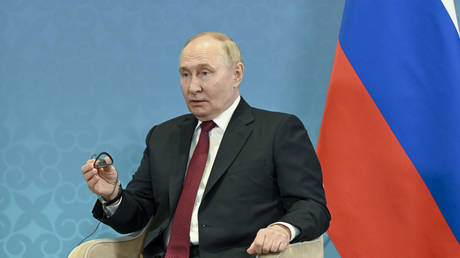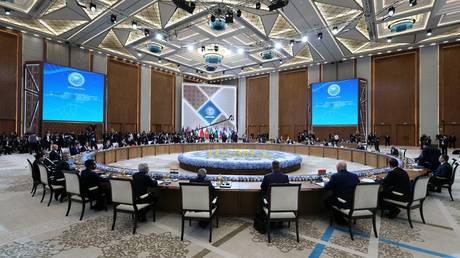ARTICLE AD BOX
The Shanghai Cooperation Organization has issued a joint declaration following a summit in Astana
The leaders of the ten countries of the Shanghai Cooperation Organization (SCO) have signed dozens of security and trade agreements during a summit in Astana, Kazakhstan.
The gathering on Thursday marked the accession of Belarus to the organization, which already included China, India, Iran, Kazakhstan, Kyrgyzstan, Pakistan, Russia, Tajikistan, and Uzbekistan – a composition that puts the core of the SCO in Central Asia.
Following the summit in Kazakhstan, the SCO issued a final declaration that updated its position on global governance and environmental issues.
Multipolarity
SCO members have “close or coinciding assessments” of regional and international matters, and seek the creation of a “new democratic, just, political and economic international order,” the document says.
This transition faces resistance in the form of “increased use of force, systematic violation of international law, geopolitical confrontation, and conflicts” that pose risks to SCO members, it added.
Non-interference
SCO leaders have pledged that their governments will not participate in “any decision aimed at interference” in the internal affairs of other states or those that “contradict international law.”
Read more Shanghai Cooperation Organization is bedrock of multipolar world – Putin
Shanghai Cooperation Organization is bedrock of multipolar world – Putin
As an example of improper actions, the declaration mentions meddling under the guise of the protection of human rights. Member states consider these rights to be universal, indivisible, and interconnected, and believe that sovereign nations have the responsibility to defend them in their respective jurisdictions.
Indivisible security
The UN must remain the primary international forum for coordinating relations between states. In order to do this effectively, reform is needed “to ensure the representation of developing nations,” the statement says.
While the SCO is Asia-centric, the approach of its members to building non-confrontational relations “can serve as the basis for creating an architecture of equal and indivisible security in Eurasia.”
Factors of instability
SCO leaders have identified several factors behind global instability, including attempts by some nations to develop global anti-ballistic missile systems. This amounts to “the creation of security for themselves at the expense of the security of other states,” the declaration reads.
The document supports international agreements on the reduction and control of weapons of mass destruction. The world needs better monitoring and enforcement mechanisms that would have legally binding power over all signatory nations to keep nuclear, chemical, and biological arms in check, it adds.
The SCO also expresses commitment to the peaceful use of space, which “should remain free from weapons of any kind,” the document says.
Terrorism
The Astana declaration cites terrorism as one of the most significant global problems. SCO members consider it unacceptable to use “terrorist, separatist and extremist groups for selfish goals,” and urge all nations to avoid double standards in counterterrorism.
Read more Shanghai Cooperation Organization speeding up de-dollarization – Putin
Shanghai Cooperation Organization speeding up de-dollarization – Putin
“There can be no justification for terrorism in any form. The entire international community should decisively condemn any backing or sheltering of terrorists,” the document says. Such nations should be “isolated and exposed.”
The SCO urges measures to suppress extremist messaging online and to curb ideologies that promote “religious intolerance, xenophobia, aggressive nationalism, ethnic and racial discrimination.”
The declaration cites the conflict in Gaza, decrying the high civilian death toll caused by the hostilities between Israel and Palestinian militant groups. It urges “a full and sustainable ceasefire” and states that only a just and comprehensive resolution of the Palestinian issue can bring lasting peace to the Middle East.
Fair commerce
The Astana declaration calls for an “open, transparent, just, inclusive, non-discriminatory and multilateral” international trade system. SCO members disapprove of protectionism, unilateral sanctions and other trade restrictions.
Unilateral sanctions in particular “are incompatible with the principles of international law” and cause damage to third parties and international commerce as a whole, the document stresses.
Read more European country joins SCO
European country joins SCO
SCO leaders urge the increased use of national currencies and the development of innovative payment systems to facilitate trade.
Members also aim to harmonize and integrate their e-commerce infrastructure and other parts of the digital economy, while cooperating to counter economic monopolization.
Sustained development
The document includes a long list of areas, from atomic energy to tourism, and healthcare to waste management, in which SCO states are cooperating. It lists specific initiatives and documents that govern their joint efforts.
The organization is currently focusing on fostering sustained development, which would provide for economic growth and environmental protection. The declaration calls for the transfer of relevant green technologies to developing nations.
It stresses that the transition away from fossil fuels should be balanced and take into account the interests of energy producers and consumers.
.png)
 4 months ago
4
4 months ago
4








 English (US)
English (US)